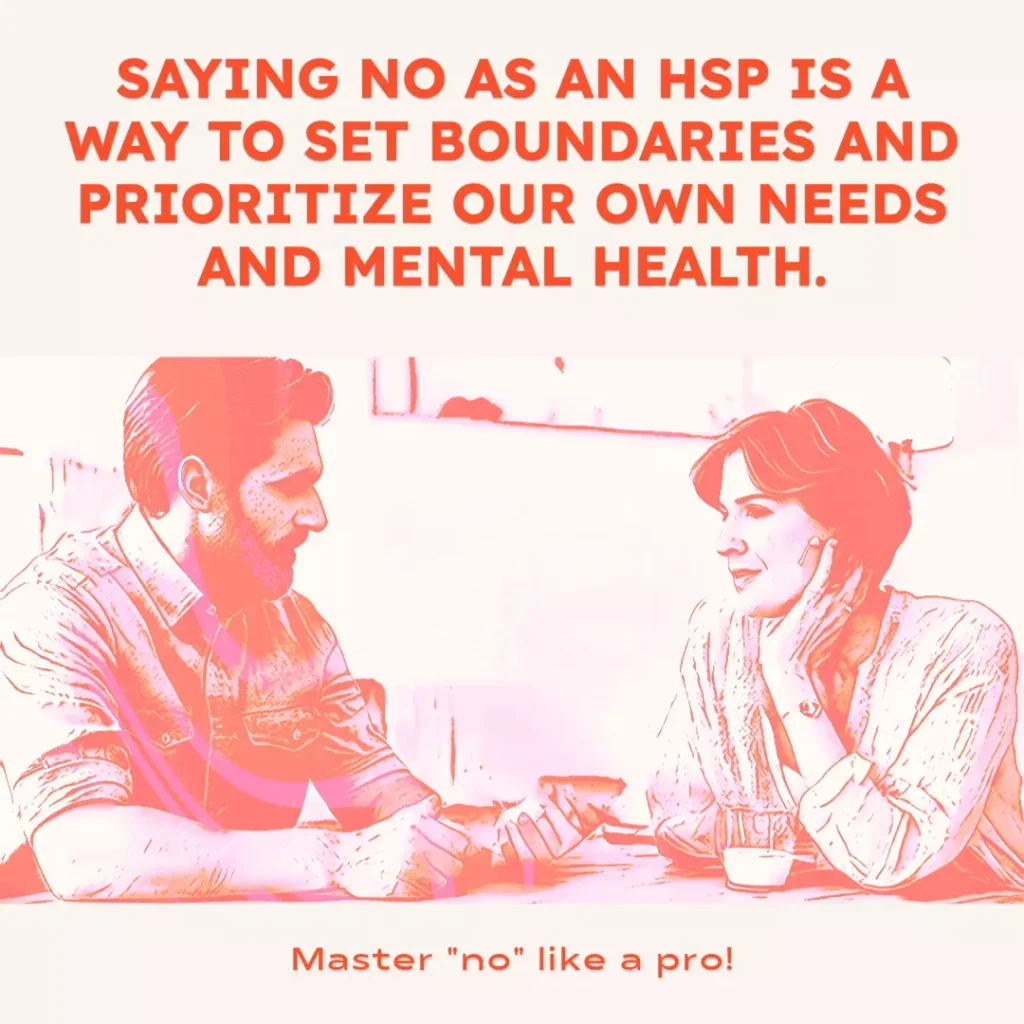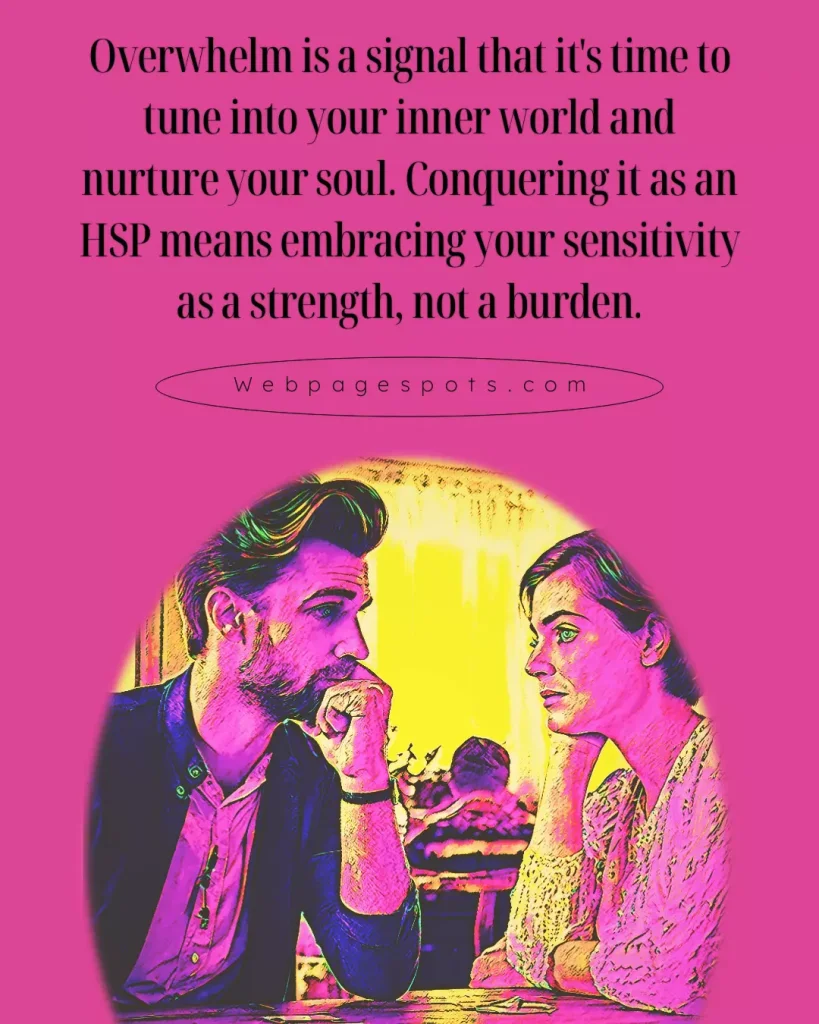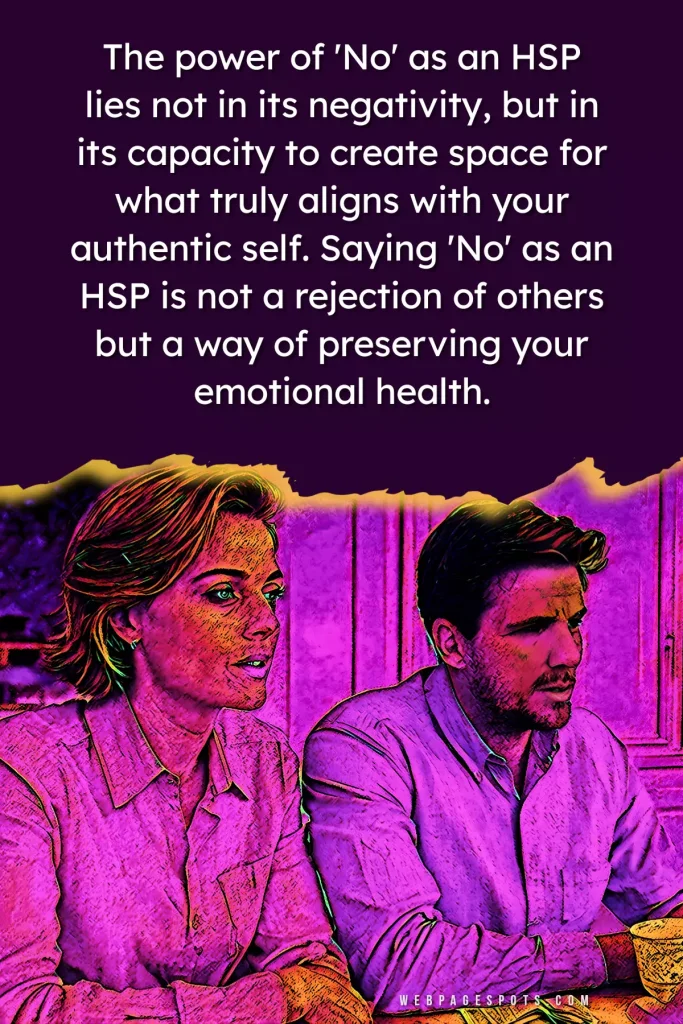9 tips for setting HSP boundaries: Master “no” like a pro!
This blog post may contain affiliate links. If we find a product or service to be useful, we encourage you to visit the website via that link. If you make a purchase through our referral link, we may receive a commission. Rest assured, you will not be charged any additional fees. By using these links, you can support us while making your purchase. For more information visit here.
Can you picture a life where your sensitivity is considered an advantage and not a drawback? Instead of being a shield, it serves as a knock on the door to actual relationships and a vibrant life. For highly sensitive people (HSP), mastering boundary setting facilitates that change.
No longer held back by people-pleasing, one pours out inner wisdom in order to live a life that rings with authenticity about being a person.
It’s not about avoiding the world; it’s about bringing your sensitivity into balance with life’s obligations.
Will you be ready to let go of the “yes” that drains you and say “yes” to a life that truly shines?
Explore your limits, jump in, and accept the challenge of finding your powerful HSP self. Your unique light is waiting—go forth and illuminate it!
Conquer Overwhelm as an HSP: 9 Tips for Setting Powerful Boundaries!
Imagine feeling every nuance of emotion and each detail of your surroundings as a playing symphony around you. That’s the world HSPs (highly sensitive people) live in.
While it confers special gifts like profound empathy and deep intuition, it also implies that overwhelm is possible in our fast-paced world.
Do not fear, tender heart! Setting powerful boundaries lets one masterfully be in charge of energy flow and gives rise to nourishing environments, truly honoring your sensitivities.
Here are 9 practical tips to help you beat overwhelm as an HSP:
1. Become an Inward Explorer
Delve deep and discover your inner needs. What drains your energy like a vampire on a rampage? Is it the loud music at work or the constant notifications buzzing in your pocket?
Identifying your personal triggers is the first step towards setting boundaries that truly protect you.
2. Speak your truth with kindness.
Remember, boundaries don’t have to be walls. Communicate assertively but compassionately with the people in your life. Clearly explain how situations affect you without blaming or making excuses. Speak your truth with confidence, but sprinkle in some kindness! Honesty helps cultivate understanding from those around you.
3. Master the Art of “No.”
Saying “no” may not come naturally to someone who is empathic and frequently prioritizes the needs of others. But remember that putting yourself first allows you to truly help others in need—it doesn’t make you selfish. With practice and firmness, you’ll be able to say “no” without feeling confused.
4. Craft your personal oasis.
In your living space, designate areas where peace reigns supreme. It could be a spot for reading or a no-fuss, don’t-mess-with-me area of the house with warm lights and cozy blankets. It might be a place for meditation with soothing music and scents. Make your placid sanctuary in the middle of the madhouse, outside those four walls.
5. Tame the Tech Tiger
In today’s digital age, screens can feel like portals to overwhelm even the most resilient souls. Establish boundaries around screen time—create tech-free zones in your home, set social media limits, and silence notifications during mealtimes or before bed. Reclaim your precious mental space and watch your overwhelm shrink.
6. Self-Care: Your Superpower!
Engage in self-care practices that replenish your energy and soothe your sensitive soul. Whether it’s taking long baths with Epsom salts, going for nature walks to soak in the calming green, practicing yoga to quiet your mind, or meditating to find inner peace, find what nurtures you and make these activities non-negotiable parts of your routine.
7. Find Your Tribe
You don’t have to navigate this alone! Surround yourself with understanding individuals who celebrate your sensitivity. Find like-minded friends, join online communities, or attend HSP meetups. Building a supportive network can be your anchor in the storm of overwhelm.
8. Listen to your body’s whispers.
Your body is a savvy educator; focus on its signs! Does nervousness sneak in at clearly defined get-togethers? Does genuine stress arise when someone surpasses your boundaries? Figure out how to perceive these indications of overwhelm and answer as needed.
Excuse yourself from setting off circumstances, practice unwinding techniques, or just pause for a minute to inhale deeply and remind yourself you are in charge.
9. Guard your emotional space.
These boundaries encompass not only external influences but also the protection of one’s emotional sanity. So, differentiate the emotions of other people from yours. It will make you powerful enough to care for them without absorbing toxic energies. Remember, it’s not your responsibility to fix everyone else’s problems.
Wrapping the section:
As an HSP, it’s more about recognizing your needs and learning how to set powerful boundaries that honor your sensitivity than shutting yourself off from the world to overcome overwhelm.
Use these tips in your daily life to transform overwhelm into calmness, nurture your sensitive soul, and achieve success in a world that is excessively bright and loud.
Keep in mind that you’re never going to be distant from everyone else, and at your center, you have the devices of self-sympathy that can assist with directing you along your way toward a day-to-day existence that feels adjusted, complete, and yours.

Why Setting Boundaries is Crucial for Those with High Sensitivity: 9 Key Reasons.
Highly sensitive people (HSPs) have an innate ability to receive and hone in on the subtleties of life around them, allowing for deep connections and deep stories.
While sensitivity can be a gift, it is equally discretionary and calls for proper emotional balance.
We will consider nine interesting facts proving that setting boundaries is the real opus of cultivation for actualizing the unique traits of highly sensitive people.
1. Recharge and refuel.
Because of their increased sensitivity to external stimuli, HSPs must place a top priority on self-care. Setting boundaries allows HSPs to use precious alone time for restorative activities like meditation or hobbies that help them refuel their energy stores.
2. Preserving Emotional Well-Being
Setting clear limits prevents HSPs from becoming overwhelmed by other people’s emotions or environmental triggers. By defining what they will and won’t tolerate emotionally, they safeguard their own mental health while still being compassionate towards others.
3. Prioritizing Relationships
Boundaries aren’t barriers—they’re bridges. Establishing personal boundaries enhances communication within relationships by encouraging open dialogues regarding individual needs and limitations. This revelation nurtures deeper connections based on mutual understanding and respect between HSPs and their loved ones.
4. Honoring Energy Levels
Extremely sensitive people are prone to experiencing energy vacillations during moments of overstimulation. Individuals who are not hypersensitive often misunderstand this peculiarity, as they have a tendency to interpret these variations as flightiness or irregularity. HSPs keep their vitality guilt-free even when they are experiencing low energy by some means by establishing limits on social activities and excessive sensory input.
5. Cultivating Personal Growth
Boundaries allow a highly sensitive individual to comfortably go through times of exploration of thoughts, emotions, strengths, wishes, and weaknesses with absolutely no distractions or intermissions from the outside world. By encouraging self-awareness, which is the first step toward self-improvement, they accomplish this.
6. Maintaining Authenticity
Boundaries give you the ability to say “no” to social pressures and expectations that don’t align with who you really are. HSPs embrace their authentic selves without bowing to the demands of society or adhering to the expectations of others.
Through clearly defined cutoff points and values, they can stay consistent with themselves while cutting out a space packed with veritable associations and encounters.
7. Enhancing Productivity
In many HSPs, sensitivity has to be balanced against high performance. Building conscious boundaries in work environments, tempo, and workload preserves a sensitive person at the same productivity level, avoiding the occurrence of burnout in this case. Finding balance in all aspects of their lives gives the HSP freedom to let their unique skills and talents shine, free from such heavy career fatigue.
8. Building emotional resilience
The highly sensitive have a very great capacity for empathy; however, they easily give in to emotional exhaustion by absorbing too much of other people’s pain. Establishing emotional boundaries prevents them from feeling overwhelmed by external influences and enhances their flexibility when faced with adversity.
9. Encouraging Self-Advocacy
The ability to effectively advocate for oneself is something that people who are highly sensitive learn through the process of setting boundaries. They can navigate life with increased self-assurance not only in their personal lives but also in their professional lives because they possess this essential skill.
Wrapping the section:
Therefore, establishing distinct personal boundaries is going to be essential in order to keep one’s mental health in excellent shape while simultaneously letting go and maintaining deep connections.
This work with ‘boundaries’ is not only about protecting themselves for HSPs; it is also the path to self-actualization for them.
They cultivate more profound connections and, as a result, a life that is more authentic to who they are by embracing sensitivity in order to do good for others.
Why Saying “No” is Your Secret Weapon as an HSP
Unleash Your HSP Superpower: Why Saying “No” Rocks Your World!
You’re practically a superhero when you’re a HSP, or, rather, a highly sensitive person. Deep emotional experience, a tight bond with others, and a deep understanding of the world around you.
However, it does its thing and can also be annoying on its own, like any superpower.
You’re going to feel overwhelmed, fatigued, and drained at times. So, do you want to unlock your full HSP potential and really live it? Learn the fine art of saying “no” like a pro!
Why “No” is Your Magic Wand:
- Energy Shield: Being an HSP, your energy is ultra-precious. Each interaction and stimulation has a share taken out of it. Saying “no” to draining situations or requests protects your energy and allows you to fully show up for what matters most.
- Confidence Booster: You can show respect for yourself and your time by setting boundaries and gracefully declining requests. A solid sense of one’s own worth and confidence will result from this respect for oneself.
- Goodbye, Overwhelm: HSPs can quickly become overwhelmed and anxious. Saying “no” puts you in control of having a clearer, more manageable environment that helps reduce stress and find peace.
- Self-Care Champion: Learning to say “no” to things that drain your energy and “yes” to those that nourish your soul is a part of real self-care. Meditation, reading, or nature walks? Use no to make self-care a priority!
- Relationship Rocket Fuel: Healthy relationships require respect and understanding. It’s setting boundaries, an element of which is the ability to say no, that creates the lines of clear communication and, thus, deeper connections where others will value and honor your needs.
Embrace Your True Power
Remember, saying “no” doesn’t mean being mean or stowing away. It’s tied in with your responsiveness and having a day-to-day existence that actually energizes you.
By dominating the force of “no,” you open up your actual potential as an HSP. You become a splendid example of the real world, bringing harmony and certainty while moving others to zero in on their own success.
Let your “no” banner fly and watch your astonishing HSP superpowers take off!

Unveiling 9 Common Challenges to Saying “No” as an HSP!
We are highly sensitive people who carry a unique combination of traits that shape us into very empathetic, intuitive, and compassionate individuals.
We are peace lovers; most of the time, we put everyone else’s interests before our own.
But this very inherent need to please others takes us along the tough road of saying “no.” This section will explore nine of the common challenges HSPs face when confronted with declining requests or setting limits.
1. Fear of making someone sad
When it comes to saying “no,” HSPs face a significant challenge because they are concerned about the possibility of discouraging or making other people feel terrible. As HSPs, laden with compassion, we typically foresee their profound reaction and fear, which can lead to either misery or dissatisfaction within us.
2. Feeling guilty like you did something wrong
The overwhelming sense of guilt that HSPs often experience after uttering that two-letter word is closely linked to the previous point. We often internalize these emotions, mistakenly believing that declining a request equates to wrongdoing.
3. Not wanting to seem rude or mean
Driven by our inclination towards kindness and maintaining harmonious relationships, being perceived as rude or mean terrifies many HSPs when faced with denying someone’s request.
4. Worrying people won’t think you like them
One innate quality that HSPs can’t miss is their extreme requirement for approval from others. Therefore, rejecting someone’s request might lead to negative judgments about their personality or how they perceive them in an unexpected manner.
5. Feeling pressured to say “yes” even when you don’t want to
Highly sensitive people (HSPs) bear a weighty burden because of their heightened sensitivity. Because of this burden, they may feel compelled to accept requests against their better judgment.
Influencers who can put pressure on them come from outside sources, such as friends, family members, colleagues, or society’s expectations.
6. Difficulty saying “no” clearly and confidently
Articulating a firm and confident “no” can turn out to be somewhat trying for HSPs, especially in light of their tendency towards carefulness and staying away from struggle. This frequently leads to ambiguous reactions or delays that are not able to actually convey their boundaries.
7. Not knowing how to explain why you’re saying “no”
HSPs value meaningful connections; hence, we often struggle with finding the right words to justify our decision honestly. This difficulty in expressing the rationale behind declining adds a layer of complexity to saying “no.”
8. Feeling like you have to explain yourself too much
Because of their heightened emotional capacity, HSPs often believe they must provide detailed explanations for every refusal—an attempt at validating their choices—leading them into a never-ending loop of excessive justifications that aren’t always necessary.
9. Worrying that other people will think you’re unreliable
HSPs fear that turning down invitations frequently or establishing just borders will portray them as unreliable people. These fears are overwhelmingly powerful in their minds, for they sincerely feel that they might threaten the relationships.
Whenever HSPs want to grow and have a better all-around life, they must face these challenges. One major thing to be noted here is that expressing one’s limits and standing up for oneself is not selfishness but healthiness in a relationship.
Being an HSP means special gifts, but it also means tricky moments. Setting boundaries and saying “no” can feel tough, yet in contrast, they hold the key to self-care and really connecting with others.

Master “No” Like a Pro with 9 Powerful Tips and Scripts
For most, saying ‘no’ is the hardest thing to say, and it immediately brings feelings of guilt or anxiety. However, learning how to say ‘no’ is an integral part of setting personal boundaries, managing time, or focusing on priorities or goals.
We will consider in this section nine useful tips that would enable one to say ‘no’ in every situation confidently while ensuring good relations and positive personal growth.
1. Understand your priorities.
Take a minute to run down your priorities before you make that decision to say “yes” or “no.” If you are really clear about what matters in your life, you will find much ease in acting consistently with your values and goals.
2. Reflect on your limits.
Be aware of your limits—physical, emotional, or mental—since these are major determinants of being able to say no without feeling guilty. You must be respectful of these limits, not taking too much that will burden you with obligations and risks to your health and well-being.
3. Hone your ability to listen with sensitivity.
At the moment that someone makes a request of you, it is important to listen carefully before immediately responding. Empathizing with what they want is important, but it is vital to keep in mind that taking into account their demands does not necessarily mean accepting them outright.
4. Know That It’s Okay to Say “No”:
Realize that saying ‘no’ does not make you selfish; instead, it describes self-respect and creates healthier boundaries within relationships. Acceptance without reservation remains key while staying true to yourself.
5. Offer alternatives (sometimes).
If circumstances prevent you from fully agreeing, but you still want to help in some capacity or suggest an alternative solution without overburdening yourself or sacrificing other commitments,…
Can’t fully commit? Suggest alternatives or connect them with someone who can help.
An example of content might be, “I can’t completely commit as of now because of my ongoing responsibilities; but I can help by offering you guidance or placing you in contact with somebody who may be free.”
6. Be clear yet polite.
Decisiveness is urgent while saying ‘no’, actually. Discuss your choice with lucidity and certainty, while keeping a pleasant tone to avoid unintentionally irritating the other individual.
Example script: “I value you considering me for this undertaking; however, sadly, I’m not ready to do it at the present time. Much thanks to you for thinking about me.”
7. Avoid over-explaining.
When one is turning down a request, avoid overexplanation and excessive apology, as this can weaken one’s position and perception of the set boundaries.
Example: “While I understand the importance of this project, my present workload does not permit me to dedicate appropriate time and due attention to it.” A simple “Thank you for understanding” will do.
8. Choose your words wisely.
Choose words mindfully when saying ‘no,’ ensuring they empathize with the situation while remaining true to your intentions. Be mindful, like, “While the project sounds great, I can’t dedicate the time it deserves right now.“
9. Help Within Boundaries
Sometimes, genuine need persists. Offer limited support to show empathy without compromising yourself. “I can’t join the meeting, but I’m happy to share my notes.“
Wrapping the section:
Mastering the art of saying ‘no’ requires practice, self-awareness, and understanding personal values along with one’s limits effectively. By implementing these nine powerful tips and scripts in different scenarios, you can confidently decline requests without guilt or anxiety while enhancing relationships.
Setting Digital Boundaries for HSPs (Saying No to Social Events Without FOMO)
Setting Digital Boundaries: For HSPs, Saying No Can Mean Feeling More
In our highly connected world, HSPs, with acute awareness and emotional sense, sometimes feel overwhelmed by the constant online demands.
Devices flooded with social media notifications, group chats, and event invites confuse them by drawing a fine line between social connection and mental well-being.
It’s the setting of the boundaries in one’s digital space through which one becomes an authentic and thriving HSP, not shackled by fear. Here are some strategies to consider:
1. Prioritize yourself.
HSPs, remember your needs first! Unplug daily for activities that nourish you, like reading, meditation, or nature walks. This self-care prepares you for potential online overload.
2. Create offline pockets.
Schedule breaks during busy weeks. These “me-time” periods away from screens and interactions allow you to process emotions authentically, without external stimuli.
3. Selectively choose virtual commitments.
Avoid feeling obligated to agree with everything you see on the internet. Choose to get busy with virtual events and group activities that truly resonate with you, even if doing so requires you to decline participation from other individuals; remember that quality connections are more important than quantity!
4. Communicate authentically
Make sure that your friends and family are aware of your specific requirements. Demonstrate to them an alternative way of approaching social interaction. Understanding your “no”s can empower you without making the other individual feel avoided.
5. Connect authentically offline.
Develop meaningful relationships with others in person, either by meeting your friends regularly or by participating in activities that give you a chance to connect face-to-face.
Besides helping you build deeper relationships, these activities will also make you more capable of moving beyond the identity you create on the web.
6. Curate your social media presence mindfully.
Social media contains two sides of the same coin. If you want to curate your feed with positivity, avoid comparison traps. Instead of following accounts that make you feel down, follow those that make you feel better. Once more, place quality over quantity!
7. Create tech-free zones.
Designate no-technology areas in your home—places where you can disconnect from the internet. In those places, self-connection is more focused, creating a distinction between the external digital formation and your internal being.
An HSP needs to settle down between practicing care, going out, and finding work in both the computerized and real worlds. It means taking your time, moderating it online, and being honest about your needs.
Here, HSPs can connect honestly by having experiences that are ready to be remembered deeply and making safe spaces to avoid feeling lonely because of fear of missing out (FOMO).
Remember, saying “no” does not mean rejecting people; it’s choosing yourself and your successful life.
Reap the Rewards: 9 Benefits of Mastering “No” for Highly Sensitive People (HSPs)
Saying “no” is a big deal to a highly sensitive person.
HSPs often find themselves burdened with unnecessary responsibilities and compromised well-being as they express their fears of rejection or the demands of others.
However, learning to say “no” can muster up incredible outlays for someone’s quality of life.
This paper will reveal nine rewards for those who become assertive—assertive enough to recognize their own needs above others’.
1. Deeper Connections
When HSPs can say “no,” they can focus on piercing relationships. They can make additional significant investments in the cultivation of further, more significant connections because they restrain themselves from extending themselves too far.
2. Reduced People-Pleasing
Mastering “no” helps HSPs break free from unhealthy, people-pleasing tendencies. This can liberate them from feeling responsible for others’ happiness and empower them to focus on their own fulfillment.
3. Enhanced Intuition
The ability to say “no” helps HSPs follow their instincts and avoid depleting or inauthentic situations. This is what might yield better-adjusted decisions and encounters and, therefore, be in resonance with the sensitivities or knowledge of such persons.
4. Stronger Boundaries with the World
With the practice of the “no” word, HSPs learn to build spaces that feel safe for them. They learn how to filter the various stimuli from the outside world or avoid negativity that overwhelms their emotions. The result in the long run is the formation of personal serenity and regulation of one’s feelings.
5. Boosted Energy Levels
HSPs can protect the most valuable things—energy stores—by saying “no.” After spending money on things that wear them down, HSPs can focus on things that renew them for the least cost. This will make them healthier and provide them with a richer experience of life.
6. Reduced decision fatigue
Mastering “no” simplifies decision-making for HSPs. By learning to confidently decline, they eliminate unnecessary options and can focus their energy on choosing what truly matters to them.
7. Increased Sense of Agency
HSPs gain the ability to take charge of their lives when they learn to utter the word “no.” They would understand that they can actually control the experiences they expose themselves to and have the power to decide over them, enhancing their self-confidence and autonomy.
8. Improved Time Management
Mastering “no” allows HSPs to handle their time better. They can create a schedule that supports both productivity and self-care if they commit to things that blend in with their values and sensitivities.
9. Inspiring Others to Set Boundaries
Besides, those HSPs who can accept “no” serve as role models for others, particularly those who are too quiet to assert themselves or establish boundaries. It leaves a cascading influence, which, as a result, leads to increased empathy and understanding, as well as a transformed world in which everyone considers themselves capable of taking care of themselves.
Wrapping the section:
Highly sensitive people have to learn to say “no” in order to find personal satisfaction amidst constant, most times overwhelming, needs from others. Saying “no” allows the HSP to take charge of their energy, reduce stress, and avoid feeling overwhelmed.
It paves the way to better self-care, stronger relationships, and higher productivity, while also growing personnel to live authentically and thrive amidst ordinary challenges.
Conclusion
Do not back away from the world, but embrace your identity as an HSP without turning your back on it; it is about envisioning it as a harmonious duet between life’s demands and your sensitivity.
Your “no” alone cannot be a limitation; instead, find it to bridge you into deeper connections. It can help move you farther from isolation.
Psychological attention now focuses on the proper development of authentic relationships, self-care, and manifestations of the unique sense of self. Setting boundaries requires skill, yet it leads to genuine transformation.
Tapping deep into intuitive wisdom to cast off the shackles of people-pleasing cultivates an invigorating wellspring from within.
Saying no confidently to what drains you means opening up your arms to a life that fully aligns with your HSP soul.
Remember, your superpower is sensitivity. Having boundaries empowers you to apply them graciously and with a sense of purpose.
Take a self-disclosure round trip to track down your limits and create a daily routine that resonates past the bustle of experiencing an inauthentic, delicate life.
The world is waiting, in fact, hungering for your different light, which will shine brightly within the framework of healthy, self-defined boundaries. Forge ahead and light it up!
Understanding the importance of copyright law is absolutely vital, as it strictly prohibits any reproduction or replication of works without the explicit permission of the author. Any unauthorized duplication of content will lead to legal action for copyright infringement under Section 14 of the Copyright Act.











